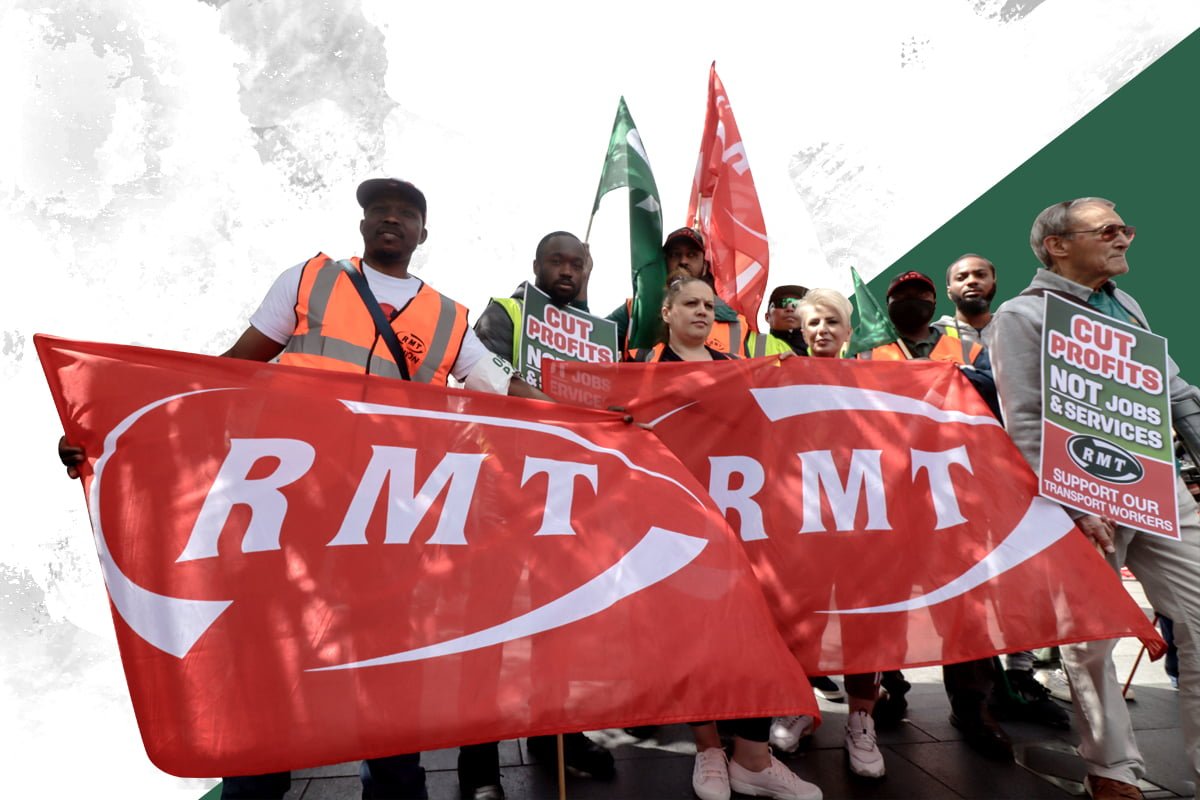RMT members on Britain’s railways will resume strike action tomorrow (Friday 2 June), with a walkout involving 14 of the largest train operating companies (TOCs), in the ongoing dispute over pay, pensions, jobs, and conditions.
This follows on from a successful strike ballot, returning a 90% ‘Yes’ vote on a turnout of nearly 70%. This gives the union a resounding third mandate for industrial action in this battle against the bosses.
This latest vote represents a decisive rejection of the Rail Delivery Group’s (RDG) below-inflation pay offer of 5% plus 4%, spread over two years. Above all, it shows the resolve of rail workers, now one year into their struggle.
Attacks
The Tories have inflamed the situation with their demand that any deal should be contingent on the RMT terminating its industrial mandate.

This would effectively mean giving the bosses a free hand to implement all further attacks – namely, the so-called ‘workplace reform’ agenda.
For this latest wave of strike on the railways, RMT members will be joined by train drivers organised in ASLEF, who went out yesterday (31 May) and will be out again on Saturday (3 June).
RMT members on the London Underground (LU), meanwhile, have likewise won a fresh strike mandate, with a 96% ‘Yes’ vote on a 56.5% turnout.
Here, again, members on LU have been angered by the brazen provocation of the Tory government in its search for cuts.
Proposed measures include a staggering 32% fall in pensions for members retiring at 60, and an uplift in contributions from 5% to 12.5% – all while 600 jobs are cut across Tube stations.
Profit
These coordinated attacks against rail workers come alongside record profits for the fat cats.
The RMT estimates that the TOCs have accumulated £400 million in profits since the start of the pandemic, while their bosses have received obscene pay rises. Just two TOCs paid out £82 million in dividends in 2022 alone.

At the same time, the rolling stock racket continues to thrive. Under this, three dominant monopolies own and lease almost 90% of Britain’s trains, taking in the lion’s share of the wealth that rail workers produce.
In just three months, one of these companies, Angel Trains, paid out £75 million to its shareholders. And most of this went offshore, not to be reinvested in the UK railway system.
All the while, cancellations have reached their peak, in what the RMT has identified as “the worst rail performance since the Office of Rail and Road [ORR], Britain’s rail regulator, began recording performance figures”.
Many stations remain abandoned due to service cuts. Expansion projects such as HS2 and Crossrail 2, meanwhile, are mired in delays, corruption, and all manner of bureaucratic mismanagement.
Under this decrepit system, where archaic infrastructure crashes head on with the short-sighted goals of private profit, we can only expect the railways to decay, while the parasitic rail monopolies suck any remaining lifeblood out of them.
On the other hand, if this wealth was controlled by those who produce it, the rail workers, then we could truly develop a cheaper, safer, and more efficient railway network for all.
Capitalist logic
It is the logic of the bosses to try to increase their profits, not by investing in real modernisation, but by cutting down workers’ pay and conditions, further degrading infrastructure in the process.
The Tories, faithful to their class interests, are particularly intent on ensuring that this happens in this dispute, so as to break the union. They have spent an astonishing £1.2bn compensating the TOCs, in order to achieve this aim.
One Tory minister explained it rather bluntly when, admitting that the TOCs’ indemnification was far higher than the cost of resolving the dispute, continued to say: “But, again, we have to look at the overall impact on the public sector pay deals that are taking place.”
In other words, the militancy of the RMT must be smashed, in order to hold down workers’ wages throughout the public sector – and across the whole economy.
The Tory government, then, is actively sabotaging any negotiation efforts. The TOC bosses would rather come to a resolution faster, but are being held in line. It is therefore completely correct to take this fight to the Tories.
It should go without saying, however, that the bosses are not on the side of rail workers either. At best, their empty phrases for a return to ‘good industrial relations’ reflect their desire to negotiate their way into the best deal for themselves.
At worst, they use these such phrases as a distraction, attempting to shift blame as they play a waiting game – all while not losing a penny, thanks to the Tories.
No trust in the bosses!
The best way to fight for victory in these rail strikes, therefore, is not through appealing to the Tories, TOCs, bosses or ORR, but by rail workers relying on their own industrial muscle.

The Tories evidently remain happy to dish out eye-watering amounts of money to keep the dispute going, and have successfully held out so far in previous rounds of strikes.
What is required then – to force the bosses’ and Tories’ hands – is escalated and united action.
Recent struggles should serve as inspiration for this. West Midlands National Express drivers, for example, won recently by taking all-out action and enforcing hard pickets. Offshore rig workers, meanwhile, are currently undertaking the biggest wave of industrial action in the industry for a generation, hitting energy bosses where it hurts – in the profits!
Above all, we must state clearly that the two-faced employers, the RDG, cannot be trusted. There is no chance of any return to the old status quo of ‘good industrial relations’ at a time when the bosses and Tories are under pressure to make cuts everywhere – at rail workers’ expense, and for their own gain.
They have syphoned off hundreds of millions from the railways already. It is high time that these leeches should be expropriated, with the entire sector placed under democratic workers’ control, in order to implement a safe, quality, and affordable railway system.
United struggle
All the while, strike mandates are ongoing in the PCS, NEU, and BMA unions, and many others, including those in the rail and transport industry. Similarly, hundreds of thousands of local government workers are balloting for action.
The possibility for mass coordinated action – including a public sector wide strike – is there. Indeed, the Tories live in fear of these strikes escalating and uniting across the labour movement.

This is implicit in their rushing through of the minimum service anti-union bill, and their attempts to isolate unions and splinter the strikes.
Rail unions should therefore use these present disputes as a launchpad for a united struggle against the Tories – a fight to the finish.
The goal should be to repeal all the anti-union laws; to bring down this rotten Tory government; and to fight for clear socialist policies, including the nationalisation – without compensation – of the railways and train operators, the big banks, and all the other major monopolies.
On the basis of a socialist economic plan, run under democratic workers’ control, we could provide real pay rises to all workers, with wages tied to inflation; we could improve conditions across the board; and we could invest properly in the country’s public services.
This is the bold socialist programme and vision that the labour movement should take up, in order to win for our class.






